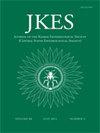建筑地基骨料填料中液体杀白蚁剂的平流
IF 0.3
4区 农林科学
Q4 ENTOMOLOGY
引用次数: 0
摘要
在两种不同的建筑基础骨料填充物(ODOT基础A型砾石和A- 57级碎石)表面应用后,测定了两种液体杀菌剂的平流。每个团聚体中的残留物在24小时后以及施用后6个月和12个月作为两个复合土芯取样,在两个5.1 cm的增量分区中取样,深度为10.2 cm。一半的试验田被压实,一半的试验田没有被压实。平流受聚集类型的影响显著。与未压实的集料相比,压实的集料内的残留对单个杀白蚁剂是相似的。一些杀白蚁剂完全分散,通过聚集体到达下面的土壤。在ODOT基层a型砾石充填体中,平流导致a.i.浓度随着深度的增加而降低,浓度最高的区域位于顶部5.1 cm的分区,可能是由于细颗粒成分的原因,几乎没有杀白蚁剂到达下伏土壤。相比之下,在A类- 57 #碎石填筑物中,杀虫剂的残留量分布更均匀,在整个10.2 cm深度的残留量相似,其中一些残留在下垫土中。本文章由计算机程序翻译,如有差异,请以英文原文为准。
Advection of Liquid Termiticides within Building Foundation Aggregate Fill
Advection of two liquid termiticides was determined within two different building foundation aggregate fills, ODOT Base Type-A Gravel and Class A-#57 Crushed Rock, after over-the-surface applications. Residues within each aggregate were sampled as two composite soil cores taken in two 5.1-cm incremental partitions to a depth of 10.2-cm after 24 hours, and at 6 and 12 months post-application. Half the test plots were compacted and half remained not compacted. Advection was significantly influenced by aggregate type. Residues within compacted compared with not-compacted aggregates were similar for individual termiti-cides. Some termiticide dispersed completely through the aggregates to reach the soil beneath. Advection resulted in decreasing a.i. concentrations as depth increased within ODOT Base Type-A Gravel fill, with the greatest concentration located in the top 5.1-cm partition, likely due to the fine particle component, with almost no termiticide reaching underlying soil. In contrast, termiticides were more evenly distributed within Class A-#57 Crushed Rock fill, as residue amounts were similar throughout the 10.2-cm depth, with some reaching underlying soil.
求助全文
通过发布文献求助,成功后即可免费获取论文全文。
去求助
来源期刊
CiteScore
1.60
自引率
0.00%
发文量
12
审稿时长
>12 weeks
期刊介绍:
The Journal of the Kansas Entomological Society is a publication of the Kansas (Central States) Entomological Society, publishes research on all aspects of the sciences of entomology, and has world-wide authorship and readership.

 求助内容:
求助内容: 应助结果提醒方式:
应助结果提醒方式:


